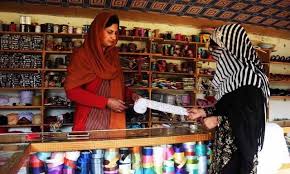Women workers being paid less than Rs 5 for stitching a single garment

Karachi: If you thought your boss was paying you less, you should meet the home-based women workers who are paid less than Rs 5 for stitching a single garment. “The work is given to us by a contractor who is our only point of contact. The contractor does not tell us if the garments are for a [international] brand or not,” a Karachi-based woman who works from home for a garment brand told Human Rights Watch in a field survey released on January 23. “The payment varies from Rs2 to Rs4 per piece,” she said. These stitching jobs can take hours. “At times, the contractor does not tell us the rate before production saying, ‘We will discuss the rate once you have finished the order.’ We can’t bargain because if we do then the contractor will not give us the order the next time,” a private television channel quoted her as saying. It is common practice to hire workers on a “piece-rate” based on a production quota. Some garment factories producing for domestic brands use home-based workers for special orders or on a seasonal basis. They are mostly women working from home. This practice adds to worker insecurity because it takes away the guarantee of a fixed income. Moreover, these workers are often denied labuor law protections. They are not able to join factory unions, and their work remains largely unregulated and vulnerable to middlemen, who often refuse to pay minimum wage. Women workers are exceptionally disempowered and discriminated against in the garment industry in Pakistan, the global human rights organization said in its report, ‘No Room to Bargain: Unfair and Abusive Labor Practices in Pakistan’. These revelations may not be surprising when seen in the context of the World Economic Forum’s Global Gender Gap Report 2016, which ranks Pakistan 143rd out of 144 countries in the gender inequality index, better than only Yemen. “Many women are employed as a contract, piece-rate, non-unionized workers in low-paid and low-skilled roles,” the Human Rights Watch said. The report highlights poor working conditions at garment factories, which employ 4.2 million people, most of whom are women. It identifies a range of labour rights violations affecting the lives of these factory workers whose plight remains off political agenda of the country’s ruling elite In a field survey of 140 people from 24 factories in Karachi, Lahore, and Hafizabad, workers, many of them women, said that they experienced verbal abuse, were pressured not to take toilet breaks and were even denied clean drinking water. People demanding their rights could be threatened or fired. The government has, by and large, failed to protect garment workers from these abuses. When it comes to gender disparity, even the regulator shows a gloomy picture. According to one estimate, there are only 537 labour inspector for 350,000 factories in the country, but there are only 17 women labour inspectors.




